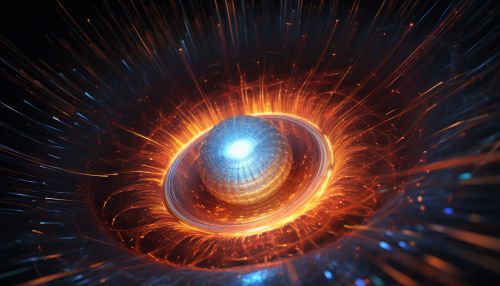Spin (physics)
Introduction
In the realm of quantum mechanics, spin is an intrinsic form of angular momentum carried by elementary particles, composite particles (hadrons), and atomic nuclei. Unlike classical angular momentum, spin has proven to be a complex and abstract concept that defies simple visualization.
Quantum Numbers and Spin States
Spin is quantified by a number known as the spin quantum number, denoted by s. This number is a non-negative integer or half-integer value that varies depending on the type of particle. For instance, electrons, protons, and neutrons, which are all fermions, have a spin of 1/2. On the other hand, particles like photons and pions, classified as bosons, possess an integer spin.


The spin quantum number gives rise to multiple spin states. For a particle with spin s, there are 2s + 1 possible spin states. For example, an electron with a spin of 1/2 can exist in two spin states, often referred to as spin up and spin down.
Spin and Magnetic Moments
Spin is closely related to the magnetic moments of particles. In the presence of a magnetic field, particles with spin will experience a torque that tends to align their magnetic moment with the field, a phenomenon known as precession. This effect is fundamental to technologies such as nuclear magnetic resonance (NMR) and magnetic resonance imaging (MRI).
Spin in Quantum Mechanics
The concept of spin was first introduced in the context of quantum mechanics to explain the anomalous Zeeman effect, a deviation in the Zeeman effect observed in the spectral lines of atoms. The mathematical formulation of spin in quantum mechanics is encapsulated in the Pauli spin matrices, which form a representation of the SU(2) group, the group of rotations in three-dimensional space.
Spin-Orbit Interaction
The spin-orbit interaction is a type of interaction between the spin of a particle and its orbital motion. This interaction is responsible for fine structure splitting in atomic spectra and plays a crucial role in the electronic structure of atoms and solids, influencing phenomena such as magnetism and superconductivity.
Spin in Quantum Field Theory
In quantum field theory, spin is a fundamental property of particles that is tied to their representation under the Poincaré group, the group of symmetries of spacetime. The spin-statistics theorem in quantum field theory connects the spin of a particle to its statistics, stating that particles with integer spin are bosons, while particles with half-integer spin are fermions.
Spintronics
Spintronics, or spin electronics, is a field of research that aims to exploit the spin of particles, particularly electrons, in solid-state devices. This field has the potential to revolutionize electronics by providing faster, more efficient, and more versatile devices.
